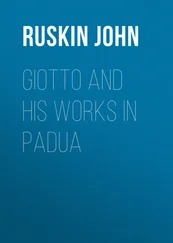John Ruskin - Selections From the Works of John Ruskin
Здесь есть возможность читать онлайн «John Ruskin - Selections From the Works of John Ruskin» — ознакомительный отрывок электронной книги совершенно бесплатно, а после прочтения отрывка купить полную версию. В некоторых случаях можно слушать аудио, скачать через торрент в формате fb2 и присутствует краткое содержание. Жанр: foreign_antique, foreign_home, literature_19, visual_arts, на английском языке. Описание произведения, (предисловие) а так же отзывы посетителей доступны на портале библиотеки ЛибКат.
- Название:Selections From the Works of John Ruskin
- Автор:
- Жанр:
- Год:неизвестен
- ISBN:нет данных
- Рейтинг книги:4 / 5. Голосов: 1
-
Избранное:Добавить в избранное
- Отзывы:
-
Ваша оценка:
- 80
- 1
- 2
- 3
- 4
- 5
Selections From the Works of John Ruskin: краткое содержание, описание и аннотация
Предлагаем к чтению аннотацию, описание, краткое содержание или предисловие (зависит от того, что написал сам автор книги «Selections From the Works of John Ruskin»). Если вы не нашли необходимую информацию о книге — напишите в комментариях, мы постараемся отыскать её.
Selections From the Works of John Ruskin — читать онлайн ознакомительный отрывок
Ниже представлен текст книги, разбитый по страницам. Система сохранения места последней прочитанной страницы, позволяет с удобством читать онлайн бесплатно книгу «Selections From the Works of John Ruskin», без необходимости каждый раз заново искать на чём Вы остановились. Поставьте закладку, и сможете в любой момент перейти на страницу, на которой закончили чтение.
Интервал:
Закладка:
And in this mystery of intermediate being, entirely subordinate to us, with which we can deal as we choose, having just the greater power as we have the less responsibility for our treatment of the unsuffering creature, most of the pleasures which we need from the external world are gathered, and most of the lessons we need are written, all kinds of precious grace and teaching being united in this link between the Earth and Man; wonderful in universal adaptation to his need, desire, and discipline; God's daily preparation of the earth for him, with beautiful means of life. First, a carpet to make it soft for him; then, a coloured fantasy of embroidery thereon; then, tall spreading of foliage to shade him from sun heat, and shade also the fallen rain; that it may not dry quickly back into the clouds, but stay to nourish the springs among the moss. Stout wood to bear this leafage: easily to be cut, yet tough and light, to make houses for him, or instruments (lance-shaft, or plough-handle, according to his temper); useless, it had been, if harder; useless, if less fibrous; useless, if less elastic. Winter comes, and the shade of leafage falls away, to let the sun warm the earth; the strong boughs remain, breaking the strength of winter winds. The seeds which are to prolong the race, innumerable according to the need, are made beautiful and palatable, varied into infinitude of appeal to the fancy of man, or provision for his service: cold juice, or glowing spice, or balm, or incense, softening oil, preserving resin, medicine of styptic, febrifuge, or lulling charm: and all these presented in forms of endless change. Fragility or force, softness and strength, in all degrees and aspects; unerring uprightness, as of temple pillars, or unguided wandering of feeble tendrils on the ground; mighty resistances of rigid arm and limb to the storms of ages, or wavings to and fro with faintest pulse of summer streamlet. Roots cleaving the strength of rock, or binding the transience of the sand; crests basking in sunshine of the desert, or hiding by dripping spring and lightless cave; foliage far tossing in entangled fields beneath every wave of ocean—clothing, with variegated, everlasting films, the peaks of the trackless mountains, or ministering at cottage doors to every gentlest passion and simplest joy of humanity.
Being thus prepared for us in all ways, and made beautiful, and good for food, and for building, and for instruments in our hands, this race of plants, deserving boundless affection and admiration from us, becomes, in proportion to their obtaining it, a nearly perfect test of our being in right temper of mind and way of life; so that no one can be far wrong in either who loves the trees enough, and every one is assuredly wrong in both who does not love them, if his life has brought them in his way. It is clearly possible to do without them, for the great companionship of the sea and sky are all that sailors need; and many a noble heart has been taught the best it had to learn between dark stone walls. Still if human life be cast among trees at all, the love borne to them is a sure test of its purity. And it is a sorrowful proof of the mistaken ways of the world that the "country," in the simple sense of a place of fields and trees, has hitherto been the source of reproach to its inhabitants, and that the words "countryman, rustic, clown, paysan, villager," still signify a rude and untaught person, as opposed to the words "townsman" and "citizen". We accept this usage of words, or the evil which it signifies, somewhat too quietly; as if it were quite necessary and natural that country-people should be rude, and townspeople gentle. Whereas I believe that the result of each mode of life may, in some stages of the world's progress, be the exact reverse; and that another use of words may be forced upon us by a new aspect of facts, so that we may find ourselves saying: "Such and such a person is very gentle and kind—he is quite rustic; and such and such another person is very rude and ill-taught—he is quite urbane."
At all events, cities have hitherto gained the better part of their good report through our evil ways of going on in the world generally; chiefly and eminently through our bad habit of fighting with each other. No field, in the Middle Ages, being safe from devastation, and every country lane yielding easier passage to the marauders, peacefully-minded men necessarily congregated in cities, and walled themselves in, making as few cross-country roads as possible: while the men who sowed and reaped the harvests of Europe were only the servants or slaves of the barons. The disdain of all agricultural pursuits by the nobility, and of all plain facts by the monks, kept educated Europe in a state of mind over which natural phenomena could have no power; body and intellect being lost in the practice of war without purpose, and the meditation of words without meaning. Men learned the dexterity with sword and syllogism, which they mistook for education, within cloister and tilt-yard; and looked on all the broad space of the world of God mainly as a place for exercise of horses, or for growth of food.
There is a beautiful type of this neglect of the perfectness of the Earth's beauty, by reason of the passions of men, in that picture of Paul Uccello's of the battle of Sant' Egidio, 24 24 "In our own National Gallery. It is quaint and imperfect, but of great interest." [Ruskin.] Paolo Uccello (c. 1397-1475), a Florentine painter of the Renaissance, the first of the naturalists. His real name was Paolo di Dono, but he was called Uccello from his fondness for birds.
in which the armies meet on a country road beside a hedge of wild roses; the tender red flowers tossing above the helmets, and glowing beneath the lowered lances. For in like manner the whole of Nature only shone hitherto for man between the tossing of helmet-crests; and sometimes I cannot but think of the trees of the earth as capable of a kind of sorrow, in that imperfect life of theirs, as they opened their innocent leaves in the warm springtime, in vain for men; and all along the dells of England her beeches cast their dappled shade only where the outlaw drew his bow, and the king rode his careless chase; and by the sweet French rivers their long ranks of poplar waved in the twilight, only to show the flames of burning cities on the horizon, through the tracery of their stems; amidst the fair defiles of the Apennines, the twisted olive-trunks hid the ambushes of treachery; and on their valley meadows, day by day, the lilies which were white at the dawn were washed with crimson at sunset.
And indeed I had once purposed, in this work, to show what kind of evidence existed respecting the possible influence of country life on men; it seeming to me, then, likely that here and there a reader would perceive this to be a grave question, more than most which we contend about, political or social, and might care to follow it out with me earnestly.
The day will assuredly come when men will see that it is a grave question; at which period, also, I doubt not, there will arise persons able to investigate it. For the present, the movements of the world seem little likely to be influenced by botanical law; or by any other considerations respecting trees, than the probable price of timber. I shall limit myself, therefore, to my own simple woodman's work, and try to hew this book into its final shape, with the limited and humble aim that I had in beginning it, namely, to prove how far the idle and peaceable persons, who have hitherto cared about leaves and clouds, have rightly seen, or faithfully reported of them.
THE MOUNTAIN GLORY
VOLUME IV, CHAPTER 20
I have dwelt, in the foregoing chapter, on the sadness of the hills with the greater insistence that I feared my own excessive love for them might lead me into too favourable interpretation of their influences over the human heart; or, at least, that the reader might accuse me of fond prejudice, in the conclusions to which, finally, I desire to lead him concerning them. For, to myself, mountains are the beginning and the end of all natural scenery; in them, and in the forms of inferior landscape that lead to them, my affections are wholly bound up; and though I can look with happy admiration at the lowland flowers, and woods, and open skies, the happiness is tranquil and cold, like that of examining detached flowers in a conservatory, or reading a pleasant book; and if the scenery be resolutely level, insisting upon the declaration of its own flatness in all the detail of it, as in Holland, or Lincolnshire, or Central Lombardy, it appears to me like a prison, and I cannot long endure it. But the slightest rise and fall in the road,—a mossy bank at the side of a crag of chalk, with brambles at its brow, overhanging it,—a ripple over three or four stones in the stream by the bridge,—above all, a wild bit of ferny ground under a fir or two, looking as if, possibly, one might see a hill if one got to the other side of the trees, will instantly give me intense delight, because the shadow, or the hope, of the hills is in them.
Читать дальшеИнтервал:
Закладка:
Похожие книги на «Selections From the Works of John Ruskin»
Представляем Вашему вниманию похожие книги на «Selections From the Works of John Ruskin» списком для выбора. Мы отобрали схожую по названию и смыслу литературу в надежде предоставить читателям больше вариантов отыскать новые, интересные, ещё непрочитанные произведения.
Обсуждение, отзывы о книге «Selections From the Works of John Ruskin» и просто собственные мнения читателей. Оставьте ваши комментарии, напишите, что Вы думаете о произведении, его смысле или главных героях. Укажите что конкретно понравилось, а что нет, и почему Вы так считаете.












